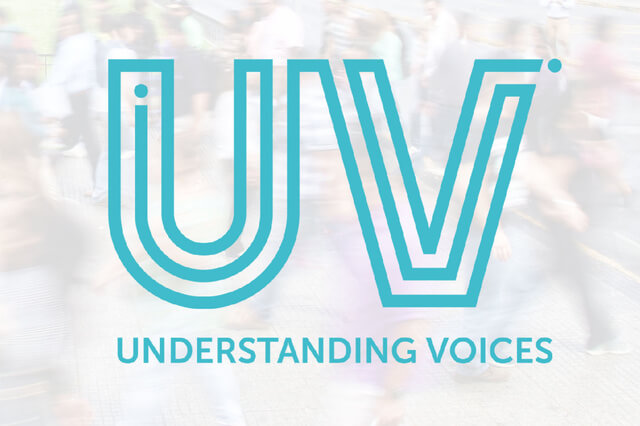 Last month we celebrated the launch of Understanding Voices, our new website for people who hear voices, their families and health professionals.
Last month we celebrated the launch of Understanding Voices, our new website for people who hear voices, their families and health professionals.
One of the main aims of our website is to make it easier for people to find information about different ways of making sense of voice-hearing, and to enable people to explore the experience of hearing voices from psychological, neuroscientific, historical, literary, spiritual and personal perspectives. Visitors to the site can find the latest research into what’s happening in the brain when someone hears voices, how some voices might be related to our own thoughts, and the relationship between hearing voices, childhood trauma and social adversity, alongside personal stories and experiences, practical advice on coping strategies, medication, talking therapy and peer support, as well as reflections on the links between hearing voices, creativity and spirituality.
Some of our favourite parts of the site include:
What is hearing voices?
Explores what it is like to hear voices, how common it is, the link between voices and psychiatric diagnosis, and the different ways in which people interpret and find meaning in these experiences.
Why do people hear voices?
Considers different answers to this question based on psychological and neuroscientific research.
A History of Voices
Four historical and literary ‘snapshots’ showing some of the diverse ways in which voices have been interpreted, represented and understood within a European context. Examines the voices of medieval mystics, of people admitted to psychiatric asylums in the nineteenth century and of famous literary authors in the early twentieth century, as well as the emergence in the late 1980s of the World Hearing Voices Movement.
Voices and spirituality
Many people interpret their voices in spiritual terms. Here we explore how spirituality can help people who find their voices distressing, and examine the ways in which voices have been understood and represented in different religious and spiritual traditions, ranging from ‘hearing the voice of God’ in charismatic Christian communities and the role of voices in Shamanism, through to contemporary cases of ‘mediumship’ (i.e. communication with the deceased).
Coping with voices
Practical information and coping strategies based on people’s experience of day to day life with voices.
Talking about voices
Practical examples and suggestions for voice-hearers and their supporters around how to start conversations about voice-hearing and talk about these experiences.
Voices and creativity
Prose, poetry and artworks produced by people who hear voices, presented alongside personal reflections on the links between voice-hearing and creative practice.
Medication
Explores personal experiences of taking medication, and presents balanced and up-to-date information about its possible benefits and adverse effects.
Therapies
Information about different therapies for dealing with distressing voices, including cognitive and trauma-based approaches, acceptance and compassion, and emerging therapies such as AVATAR, relating therapy and open dialogue.
Voices in children and adolescents
Covers a range of issues related to voice-hearing in children and young people, including personal accounts and the latest academic research, as well as information about where you can find support if you are young person struggling to cope with voices or the parent of someone in this situation.
Voices in older adults
Explores some of the factors that make voice-hearing likely to occur in older adults, including hearing loss, changes to the brain, loneliness and bereavement, among others.
We’re very keen to gather your feedback on Understanding Voices, so that we can find ways to improve it in the future. If you have a few moments to spare, please help us decide which areas of the site to develop over the next year by filling in this short online survey. Everyone who completes the survey will be entered into a prize draw for the chance to win a £100 Amazon voucher.
And if you’d like to help us spread the word, please feel free to share the website and resources on social media using the hashtag #UnderstandingVoices.
